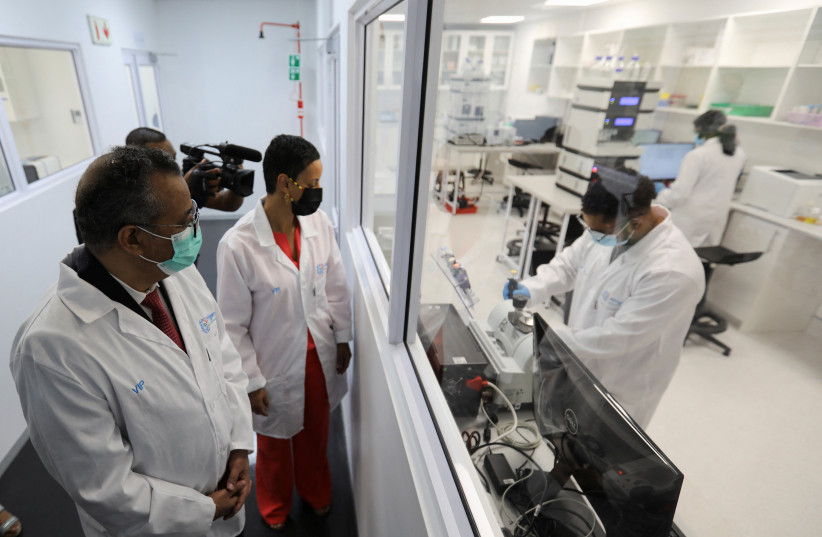According to leading epidemiologists, getting vaccines out to the world on time, including to Africa, could prevent future mutations in the next pandemic.
Although it might be too late now to make much of a difference given how many people have already been infected, the effort to get vaccines to the African continent on time has been a massive failure.
It’s true that many countries donated vaccines, including Israel, which despite its small size sent a million doses to African nations in December 2021. Still, according to the World Health Organization, just 11% of the population of the continent is fully vaccinated.
The WHO said the vaccination rate needs to increase six times if Africa is to meet the 70% target set for the middle of this year. To achieve this goal, it has set up a vaccine production facility in Africa to make copies of Moderna and distribute doses across the continent.
According to official figures, there have been 11.1 million confirmed COVID cases on the continent and 246,000 deaths. The case figures from African countries have badly underreported the full impact of the pandemic, however, as have the recorded deaths attributed to the coronavirus and its mutations. This has led some observers to claim that there was little COVID in Africa, that the continent is more resilient, or that COVID did not kill as much in Africa as it did elsewhere.

Claims that Africa has not been affected by COVID could not be further from the truth – and we should be careful that they don’t serve as an excuse for inaction when it comes to vaccination.
ALREADY, PRIOR to the pandemic, the African continent suffered enormous vulnerabilities: climate change, armed conflict, food insecurity and health emergencies like Ebola or malaria. The pandemic has exacerbated these preexisting, often structural, vulnerabilities, adding unemployment and impeding access to humanitarian aid. The virus undoubtedly harmed efforts by humanitarian aid organizations to reach people and placed aid delivery programs on hold.
In countries like Cameroon, under-nourishment affects 10% of the population, while in Zambia, Uganda and Zimbabwe, swaths of the population suffer from lack of access to food. In Ethiopia, less than half of the population receives basic drinking water services. Levels of extreme poverty, meanwhile, remain dire in sub-Saharan Africa.
Finally, the negative effects of a pandemic are typically compounded by conflict. Ebola has shown that armed conflict makes it more difficult for any government to respond to a pandemic effectively by, for example, impeding access to affected populations and the delivery of personal protective equipment.
It is clear that the COVID pandemic has exacerbated these problems and stretched the already limited resources and capacity of some African countries. Its impact is felt beyond the health sector, magnifying existing vulnerabilities and undermining already economically unstable situations.
So whatever it is that scientists cannot understand about COVID’s impact in Africa should not come at the expense of what comes next.
With only about 11% of Africa’s population vaccinated, it is not surprising that one of the biggest mutations in the coronavirus pandemic emerged from the continent. While Omicron proved to be a less dangerous mutation, new ones are already emerging, some of which might cause higher mortality.
To put it simply, the next mutation may have different results if the world once again neglects to get vaccines to the African continent on time. In recognition of this, the WHO is taking unprecedented steps to establish vaccine production facilities in African countries. These are known as “technology transfer hubs,” and they’ve been made possible by Moderna’s tacit commitment not to enforce its patent in Africa.
SOME WILL argue that it is too late for such efforts to make much of a difference now. Serological testing in Africa has indicated that massive infection of populations already exists. For example, in Nigeria, a recent sample found that for every person who had no antibodies to the virus, 958 people did.
But learning the correct lessons now can save the world tremendous suffering in the next stages of this pandemic, or whenever the world faces the next medical challenge.
A key part of this lesson means giving technological vaccine production capacity now to countries such as Kenya, Nigeria, Senegal, South Africa, Tunisia and Egypt. That will allow them to scale up production and rapidly distribute to the rest of the continent. Having the infrastructure in place can make a big difference when the next mutation or the next pandemic comes about.
Even if immunity fades following vaccination, vaccination still plays a role in containing mutations. Building vaccination capacity is something else altogether, as it enables the allocation of resources toward the creation of dedicated infrastructure. And it can be a game-changer later.
Global action and cooperation are needed to make sure that both vaccination and efforts at building vaccination capacity continue unabated in Africa. Israel’s voice is important here: it can help with research, technology and a general understanding of what it means to plan for the next hit and enhance preparedness. Israel could also take the lead in getting states to donate vaccines to the continent in a more centralized fashion and on a grander scale. Africa needs it.
The writer is a publishing expert at The Miryam Institute. She is an assistant professor in the Lauder School of Government, Diplomacy and Strategy at IDC Herzliya, where she heads the International Program in Government.
